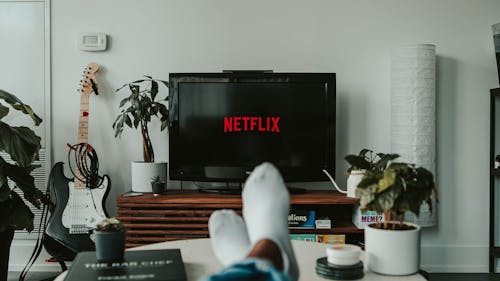PARK: Some media content is too mature for immature audiences
Column: The Queue

Media today has taken a shift to depict real issues surrounding mental health, sexual health, abuse and more. Most media consumption can be attributed to Generation Z and millennials. While most of them do not believe everything they see on the internet, some young viewers are impressionable.
TV shows have age ratings and other forms of media — like podcasts and YouTube channels — are geared toward a specific demographic. TikTok and other social media have led the younger generations into a danger zone of consuming media they may not be mature enough to understand.
Sam Levinson’s popular HBO show "Euphoria" is halfway through its second season after a three-year hiatus. The show tackles addiction, abusive relationships and sexuality among other societal issues.
Executive producer and actress, Zendaya, posted a warning to social media hours before the premiere of the second season. She prefaced that “Euphoria is for mature audiences. This season, maybe even more so than the last, is deeply emotional and deals with subject matter that can be triggering and difficult to watch.”
Levinson’s hope is that the show depicts real, honest portrayals of drugs and teenagehood. "Euphoria" does not slack in bringing awareness to topics that might not otherwise have been discussed in the media.
It is not a perfect show, but it is a valuable show in today’s society. Having a show that addresses addiction, toxic relationships, male validation, sexuality and body image can help to eliminate the negative stigma surrounding these topics.
The show grew popular among Generation Z with its glitter makeup and its attractive cast which drew a more immature audience than what it originally intended. “Euphoria” themed parties became a trend where the attire was glitter and cutout crop tops.
Many viewers seem to glamorize the aesthetic rather than understand the story the aesthetic was meant to portray. The makeup is meant to explore self-expression and show that people can put up a mask despite facing trauma.
Many people watch "Euphoria" for the drama and aesthetics, and while those aspects are appealing, there are bigger themes that we as a young audience should take from the show. The issues depicted in the show are real, and the audience should use the aesthetics as an aid to understand the issues, not romanticize them.
Millennials lead the way in consuming podcasts as a form of entertainment and media. Many YouTubers like Emma Chamberlain and Hank and John Green bring a portion of Generation Z into the mix of viewers as well. While a lot of podcasts aim to inform, it is an easily accessible form of media that audiences can be quick to misunderstand.
The controversial podcast “Call Her Daddy” has been infamous for its explicit language and topics. Hosts Alexandra Cooper and Sofia Franklyn — who has since left the podcast — aimed to stimulate sex-positive conversations in hopes of overcoming chauvinistic, anti-feminist standards.
The locker-room, girl-talk style podcast gives advice on hookup culture and performing your best sexually. The sex talks put a specific image on the podcast. Lots of viewers, mainly Generation Z and millennials, saw appeal in the raunchy topics, but it was a turn-off for others.
In June 2020, Cooper took the podcast solo after disputes in contracts with Barstool Sports, Spotify and Franklyn. Since then, the messages of the podcast have shifted while the vulgar language remains. Known as “Father Cooper” to her fans, she discusses therapy, anxiety and eating disorders — all of which stray from her original vision.
She emphasizes that being confident is not a physical trait but a mental one. The podcast still heavily discusses sex but in a way that accompanies more relatable and less salacious topics.
The new vision for “Call Her Daddy” has become more than unsolicited advice from a white, cis-gendered young woman. Cooper brings in guests like Emma Chamberlain — who has introduced a new, younger demographic to the podcast— and Chelsea Handler to bring in other perspectives on therapy, cancel culture, drugs and more.
Many of the listeners are college-aged students or younger, and “Call Her Daddy” is certainly not a typical female empowerment podcast. Cooper does not sugarcoat anything, as seen through the scandalous former episodes. This makes it hard to judge whether what is being said is satire, a joke or real advice. This emphasizes why her content should still be viewed as entertainment.
There is no doubt that Cooper makes entertaining content. The explicit content that is rarely seen so blatantly in the media makes “Call Her Daddy” relatable and honest.
As college students, we crave relatability and are quick to attempt to understand the explicit content seen in "Euphoria" and “Call Her Daddy.” But the takeaway is that neither portray the textbook version of what a high school, college or mid 20s life should look like. Immature audiences consuming media that discuss mature topics can be misunderstood easily, skewing their purpose.
Annabel Park is a Rutgers Business School first-year majoring in marketing and minoring in journalism. Her column, "The Queue," runs on alternate Fridays.
*Columns, cartoons and letters do not necessarily reflect the views of the Targum Publishing Company or its staff.
YOUR VOICE | The Daily Targum welcomes submissions from all readers. Due to space limitations in our print newspaper, letters to the editor must not exceed 900 words. Guest columns and commentaries must be between 700 and 900 words. All authors must include their name, phone number, class year and college affiliation or department to be considered for publication. Please submit via email to oped@dailytargum.com by 4 p.m. to be considered for the following day’s publication. Columns, cartoons and letters do not necessarily reflect the views of the Targum Publishing Company or its staff.



